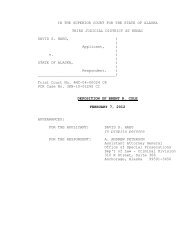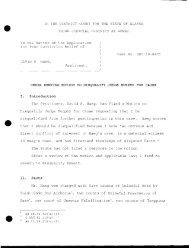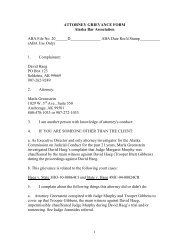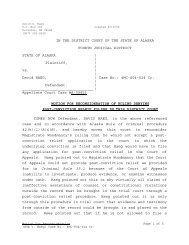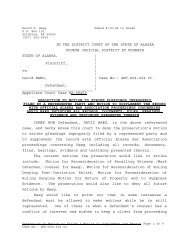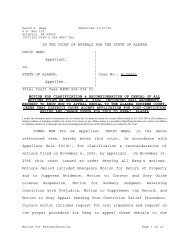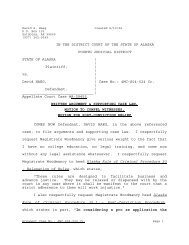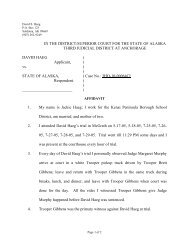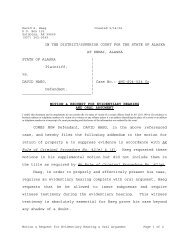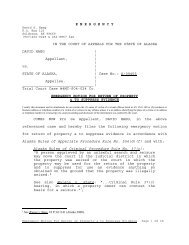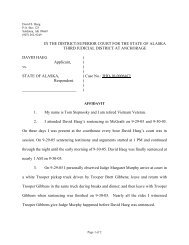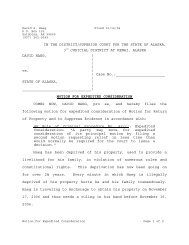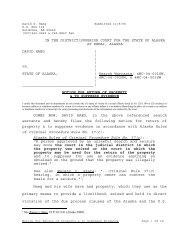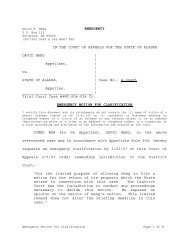PCR Exhibits - Alaska State of Corruption
PCR Exhibits - Alaska State of Corruption
PCR Exhibits - Alaska State of Corruption
You also want an ePaper? Increase the reach of your titles
YUMPU automatically turns print PDFs into web optimized ePapers that Google loves.
his right to an attorney, he cannot control his conduct, nor can he provide a coherent strategy for<br />
his defense. He repeatedly failed to comply with clear directions from the court.<br />
The hearing began at 11 :00 a.m. and ended at 10:00 p.m. With a number <strong>of</strong> short breaks,<br />
a short lunch break, and a one and a half hour dinner break, it is estimated that more than eight<br />
hours <strong>of</strong> testimony was taken. During this lengthy testimony it was apparent that the appellant<br />
could not stick to the issues before the magistrate. His inability to focus on a single issue without<br />
getting sidetracked into collateral matters is a clear indication he will not be able to address<br />
proper points on appeal. He could not describe what points he would brief on appeal, if any.<br />
On a number <strong>of</strong> occasions the appellant became argumentative with the judicial <strong>of</strong>ficer.<br />
Throughout the hearing, when objections were sustained, he continued to argue for a different<br />
outcome. While his persistence may be appropriate in a different forum, his conduct showed that<br />
he could not accept the authority <strong>of</strong> the court, even when given a clear directive.<br />
He does not understand legal strategy, legal argument, and basic legal principles and<br />
procedures. For example, he said during the hearing that he did not understand that he could<br />
make objections, or that he could be a witness for himself at a hearing that was brought by his<br />
own motion. He claimed he could read the entire book <strong>of</strong> court rules in a matter <strong>of</strong> days and<br />
understand it well enough to proceed without assistance <strong>of</strong> counsel. He was confused by the<br />
distinction between direct examination and cross examination, and could not distinguish import<br />
procedural differences between the two. He does not know when to proceed with a direct appeal<br />
post conviction relief. He thought the hearing on whether he was competent to represent himself<br />
was a post conviction relief proceeding. Any legal argument he furthers in the Court <strong>of</strong> Appeals<br />
is highly likely not to be presented coherently.<br />
To complicate matters further, his lack <strong>of</strong> legal understanding combined with his efforts<br />
to learn sufficient substantive and procedural law to enable himself to proceed without assistance<br />
<strong>of</strong> counsel, has given him a distorted impression <strong>of</strong> which rules apply to a given situation.<br />
Frequently he would take a statement from a case or the rules out <strong>of</strong> context and try to apply it to<br />
a wholly inapplicable situation. For example, appellant recited a portion from Criminal Rule 35.1<br />
(f) (1 ), which reads: "in considering a pro se application the court shall consider substance and<br />
disregard defects <strong>of</strong> form," but without considering the remainder <strong>of</strong> the sentence indicating the<br />
burden <strong>of</strong> pro<strong>of</strong> and persuasion, he argued for the far broader principle that in any post<br />
conviction proceeding (including, in his mind, is direct appeal), form is totally unimportant and<br />
that only substance mattered. He stated that form ''falls away." In another words, he is prepared<br />
to construe a part <strong>of</strong> a sentence outside <strong>of</strong> its context to enable him to represent himself in the<br />
Court <strong>of</strong> Appeals without being subject to the normal procedural requirements. This can only<br />
lead to a chaotic presentation which will be entirely disruptive to the legal process. As another<br />
example, under subsection (g) <strong>of</strong> the same rule, he understood that the "court may receive pro<strong>of</strong><br />
by affidavits, depositions, oral testimony, or other evidence." Because he was confused by the<br />
distinction between post conviction relief and an appeal, he sought affidavits from approximately<br />
twenty or more persons, including opposing counsel. At least one <strong>of</strong> the affidavits he sought<br />
contained a list <strong>of</strong> 200 questions he wanted answered. He has inappropriately filed a number <strong>of</strong><br />
motions in the Court <strong>of</strong> Appeals for 1) evidence and discovery, and 2) to compel a witness to<br />
262



